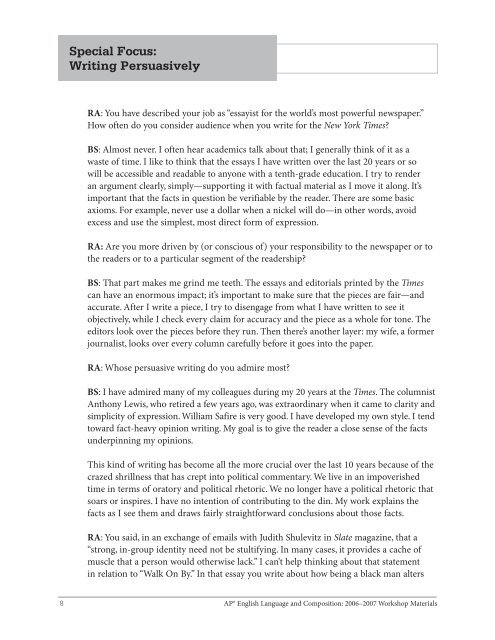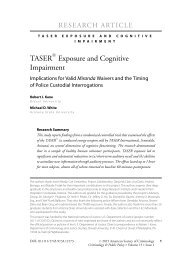1qaSADJ
1qaSADJ
1qaSADJ
Create successful ePaper yourself
Turn your PDF publications into a flip-book with our unique Google optimized e-Paper software.
Special Focus:<br />
Writing Persuasively<br />
RA: You have described your job as “essayist for the world’s most powerful newspaper.”<br />
How often do you consider audience when you write for the New York Times?<br />
BS: Almost never. I often hear academics talk about that; I generally think of it as a<br />
waste of time. I like to think that the essays I have written over the last 20 years or so<br />
will be accessible and readable to anyone with a tenth-grade education. I try to render<br />
an argument clearly, simply—supporting it with factual material as I move it along. It’s<br />
important that the facts in question be verifiable by the reader. There are some basic<br />
axioms. For example, never use a dollar when a nickel will do—in other words, avoid<br />
excess and use the simplest, most direct form of expression.<br />
RA: Are you more driven by (or conscious of) your responsibility to the newspaper or to<br />
the readers or to a particular segment of the readership?<br />
BS: That part makes me grind me teeth. The essays and editorials printed by the Times<br />
can have an enormous impact; it’s important to make sure that the pieces are fair—and<br />
accurate. After I write a piece, I try to disengage from what I have written to see it<br />
objectively, while I check every claim for accuracy and the piece as a whole for tone. The<br />
editors look over the pieces before they run. Then there’s another layer: my wife, a former<br />
journalist, looks over every column carefully before it goes into the paper.<br />
RA: Whose persuasive writing do you admire most?<br />
BS: I have admired many of my colleagues during my 20 years at the Times. The columnist<br />
Anthony Lewis, who retired a few years ago, was extraordinary when it came to clarity and<br />
simplicity of expression. William Safire is very good. I have developed my own style. I tend<br />
toward fact-heavy opinion writing. My goal is to give the reader a close sense of the facts<br />
underpinning my opinions.<br />
This kind of writing has become all the more crucial over the last 10 years because of the<br />
crazed shrillness that has crept into political commentary. We live in an impoverished<br />
time in terms of oratory and political rhetoric. We no longer have a political rhetoric that<br />
soars or inspires. I have no intention of contributing to the din. My work explains the<br />
facts as I see them and draws fairly straightforward conclusions about those facts.<br />
RA: You said, in an exchange of emails with Judith Shulevitz in Slate magazine, that a<br />
“strong, in-group identity need not be stultifying. In many cases, it provides a cache of<br />
muscle that a person would otherwise lack.” I can’t help thinking about that statement<br />
in relation to “Walk On By.” In that essay you write about how being a black man alters<br />
<br />
AP® English Language and Composition: 2006–2007 Workshop Materials



